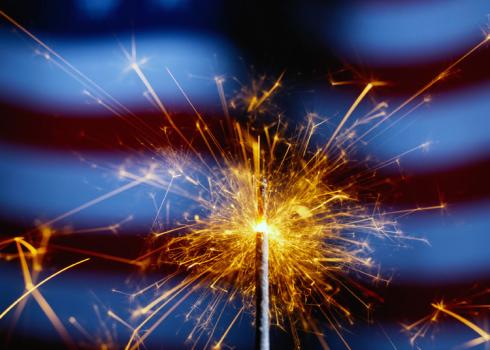4 Fun Insurance Facts for a Fabulous Fourth!

The Fourth of July is certainly the most American of holidays, literally stemming from the signing of the Declaration of Independence. In fact, it was John Adams himself who first declared that the event should be marked with a great festival every year, “solemnized with Pomp and Parade, with Shews, Games, Sports, Guns, Bells, Bonfires and Illuminations from one End of this Continent to the other from this Time forward forever more.” (Shews, in case you were wondering, is apparently just an old-timey way of spelling “shows.”)
Given that insurance is involved in almost every aspect of society, it is similarly intertwined with the July Fourth holiday in many ways. Here are some fun insurance-related holiday facts that will clearly make you the most popular guest at this year's BBQ!
Fireworks
What is the Fourth without the oohs and aahs of a dazzling fireworks display? In 2014, more than 225 million pounds of fireworks were purchased in the U.S., according to the American Pyrotechnics Association, and this year is projected to break sales records.
A few hundred years ago, fireworks caused more than a few fires in cities across early America. In fact, fire was once the most significant threat covered by insurers, which is why Ben Franklin helped form the continent's first mutual insurance company in Philadelphia in 1752.
Fortunately, fireworks usage has become much safer than it was then; however, insurance professionals continue to play a role in making sure risks at public displays are kept to a minimum.
Picnics
Nothing is better on the Fourth of July than a family picnic! We owe our love of eating outdoors in groups to the French (who will be celebrating their own Independence Day, Bastille Day, on July 14th), who began the practice known as pique-nique in the late 17th Century and post-revolution 18th Century. The French would picnic in parks, accompanied by pets, food and wine while enjoying the out-of-doors.
You know what other word we owe to the French? Insurance! The word first entered the English language in the 1550s as a variant of ensurance, which then only meant a promise to marry. It didn't gain the commercial sense in which we primarily know it now until about a century later.
Parades
Of course, many cities and towns also mark July Fourth with parades, from big extravaganzas like the one held in Philadelphia each year, to the little hometown events where volunteers tow decorated floats down Main Street. Not surprisingly, there are a lot of insurance conditions when it comes to these events, simply from the number of vehicles and people who fill the streets.
If you are going to be towing a parade float on a trailer behind your car or truck this Independence Day, better make sure to double check your insurance coverage beforehand. If you're volunteering, your auto policy will likely cover an accident, but if you're getting paid, your insurance company may consider it a commercial use. Furthermore, you might want to talk to your agent about how the float itself will be covered by your policy. Better to ask ahead of time than find out you aren't covered if someone gets hurt by falling off.
...Aliens?
One other element of Independence Day that might be top of mind for modern celebrants is Independence Day, the classic 1996 sci-fi thriller in which Will Smith saves the world from alien attack. While most people probably still love it as a guilty pleasure, more than a few people apparently view aliens as a real risk. As reported by multiple news outlets in the late ’90s, thousands of policies were sold for alien abduction insurance by at least one London-based brokerage, which will compensate policyholders in case they were kidnapped by extraterrestrials. For the rest of us, we can only hope those fireworks will scare any UFOs away!
If you have any plans for celebrating the Fourth of July this year, please do so safely.
